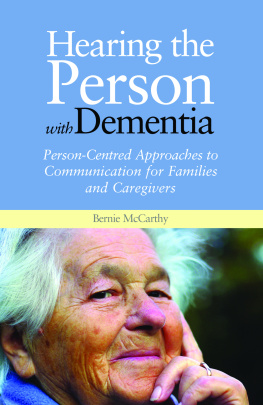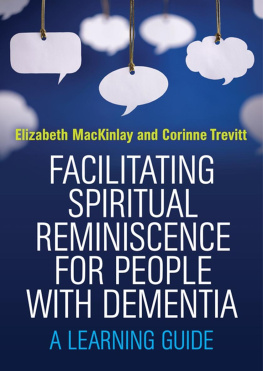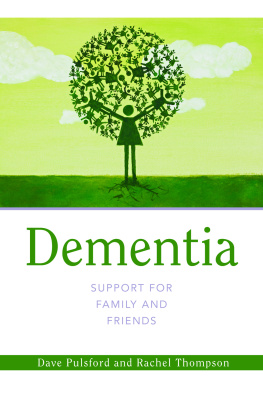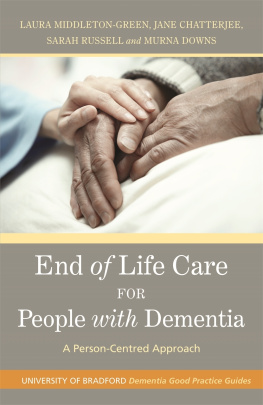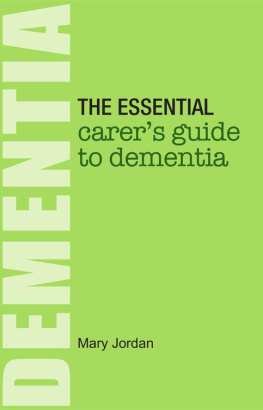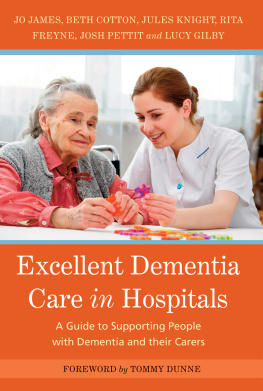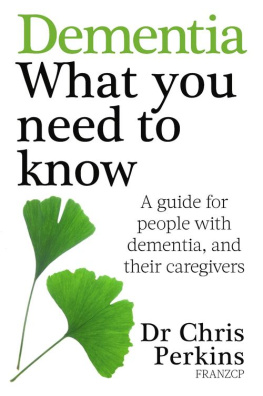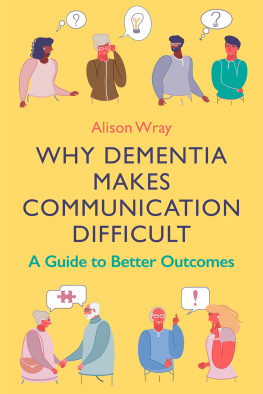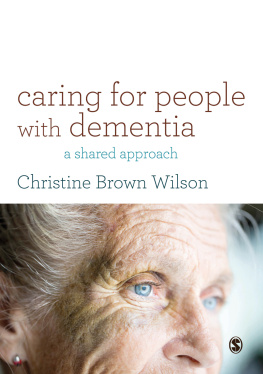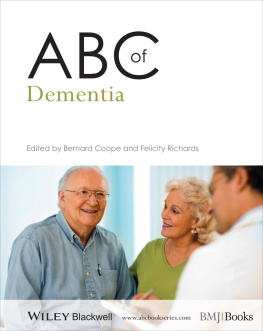Acknowledgements
I express my gratitude to Virginia Moore and Kim Wylie for opening up the person-centred approach to seeing people who live with dementia. They have inspired me to explore and understand more deeply the meaning of being person-centred. I have also been supported by Dawn Brooker who embodies this way of being in her work and relationships and whose guidance has helped me to appreciate the more subtle aspects of helping people in organisations to be more person-centred. My life with Anne and Scarlett is the well I drink from and sit at in quiet wonderment thank you. This book is dedicated to these people, to those who live with dementia and to those who care daily for the ones they love.
Appendix
Signs of well-being
Communicates wishes/needs successfully
Engaged with the people, things and events around them
Sensitive to the emotional needs of others
Positive mood shown in smiling, laughing
Engages in creative activity such as painting, singing, dancing
Shows enjoyment in interactions and events
Shows awareness of the well-being of others by being helpful
Makes social contact (eye contact, begins conversation, touches others appropriately)
Can be affectionate
Shows self-respect in attention to dress and appearance
Bodily relaxation (facial expression and body posture)
Humour, playfulness
Cooperative with requests
Enjoys life
Confident
Cheerful
Willingly participates in care
Trusts others
Comfortable with physical closeness
Signs of ill-being
Negative mood (shows upset in facial expression, posture and sounds such as whimpering, calling out, screaming or crying)
Walks into other peoples private space or into unsafe areas
Grieving, sad
Angry, aggressive
Agitated or restless
Shows anxiety or fear
Boredom
Bodily tension
Easily dominated by others
Rejected or ignored by others
Listlessness, apathy
Withdrawal
Physical discomfort or pain
Unable to enjoy things
Lonely
Makes noise, calls out or vocalises
Verbally refuses care
Suspicious of others
Physically threatens others
Conclusion
I hope the person-centred approach to caring helps you to communicate, relate well and have insight into the world of the people you care for. The world of dementia can be confusing and fearful at times, both for the person living with it and for those around them. As you enter the world of another person, your care and communication can help make their experience enjoyable, peaceful and dignified, and will enhance and sustain their personhood as you journey along using the person-centred approach through dementia with them.
Quote on reproduced by permission of Aitken Alexander Associates and
Edward de Bono. Copyright Edward de Bono.
Epigraph on reproduced by permission of Habib Chaudhury.
First published in 2011
by Jessica Kingsley Publishers
116 Pentonville Road
London N1 9JB, UK
and
400 Market Street, Suite 400
Philadelphia, PA 19106, USA
www.jkp.com
Copyright Bernie McCarthy 2011
All rights reserved. No part of this publication may be reproduced in any material form (including photocopying or storing it in any medium by electronic means and whether or not transiently or incidentally to some other use of this publication) without the written permission of the copyright owner except in accordance with the provisions of the Copyright, Designs and Patents Act 1988 or under the terms of a licence issued by the Copyright Licensing Agency Ltd, Saffron House, 610 Kirby Street, London EC1N 8TS. Applications for the copyright owners written permission to reproduce any part of this publication should be addressed to the publisher.
Warning: The doing of an unauthorised act in relation to a copyright work may result in both a civil claim for damages and criminal prosecution.
Library of Congress Cataloging in Publication Data
McCarthy, Bernie.
Hearing the person with dementia : person-centred approaches to communication for families and caregivers / Bernie McCarthy.
p. ; cm.
Includes bibliographical references and index.
ISBN 978-1-84905-186-6 (alk. paper)
1. Dementia--Nursing. 2. Dementia--Patients--Care--Psychological aspects. 3. Dementia--Patients--Family relationships. 4. Medical personnel and patient. I. Title.
[DNLM: 1. Dementia--nursing. 2. Dementia--psychology. 3. Caregivers--psychology. 4. Communication. 5. Nurse-Patient Relations. 6. Patient-Centered Care--methods. WM 220]
RC521.M389 2011
616.83--dc22
2010034866
British Library Cataloguing in Publication Data
A CIP catalogue record for this book is available from the British Library
ISBN 978 1 84905 186 6
ISBN pdf eBook 978 0 85700 499 4
Hearing the
Person with
Dementia
Person-Centred Approaches
to Communication for
Families and Caregivers
Bernie McCarthy

Jessica Kingsley Publishers
London and Philadelphia
Hearing the Person with Dementia
Introduction
Communication is the food of relationships. Good communication is nourishing, delightful and memorable. It creates intimacy, enriches us and we become better people. Poor communication is like bad food poisonous and harmful.
Bernie McCarthy
Hearing the Person with Dementia is written from my experience of working to support carers of people living with dementia at home and in residential care. It is written for these carers.
Over the years that I have worked in aged care I have witnessed the powerful effect of good communication in reaching a person previously thought to be unreachable because of cognitive impairment. And, sadly I have witnessed the effects of poor communication and seen the person wither before my eyes as they are misread and frustrated by care staff and/or family. I hope you will find many ideas and helpful ways of approaching interactions with the person you care for in the pages of this book. May they be happier, more contented and peacefully connected to and with us, and to their own lives, past and present.
of related interest
Person-Centred Dementia Care
Making Services Better
Dawn Brooker
ISBN 978 1 84310 337 0
Enriched Care Planning for People with Dementia
A Good Practice Guide to Delivering Person-Centred Care
Hazel May, Paul Edwards and Dawn Brooker
ISBN 978 1 84310 405 6
Connecting through Music with People with Dementia
A Guide for Caregivers
Robin Rio
ISBN 978 1 84310 905 1
Telling Tales About Dementia
Experiences of Caring
Edited by Lucy Whitman
ISBN 978 1 84310 941 9
References
Axel, G. (1987) Babettes Feast (film).
Bradford Dementia Group (2005) Dementia Care Mapping: Principles and Practice . University of Bradford: Bradford Dementia Group.
Brooker, D. (2004) What is person-centred care in dementia? Reviews in Clinical Gerontology 13 , 18.
Brooker, D. (2007) Person-centred Dementia Care: Making Services Better . London: Jessica Kingsley Publishers.
Chaudhury, H. (2008) Remembering Home: Rediscovering the Self in Dementia . Baltimore, MD: The Johns Hopkins University Press.
Killick, J. (1997) You Are Words: Dementia Poems. London: Hawker.
Killick, J. and Cordonnier, C. (2000) Openings: Dementia Poems and Photographs. London: Hawker.
Kitwood, T. (1997) Dementia Reconsidered: The Person Comes First . Buckingham: Open University Press.
Kitwood, T. and Bredin, K. (1992) Towards a theory of dementia care: personhood and wellbeing. Ageing and Society 12 , 269287.
Next page
